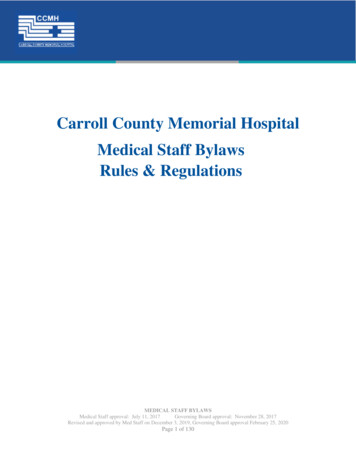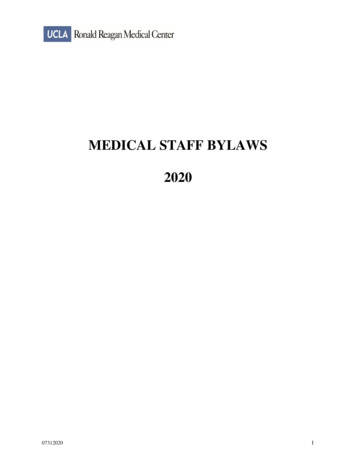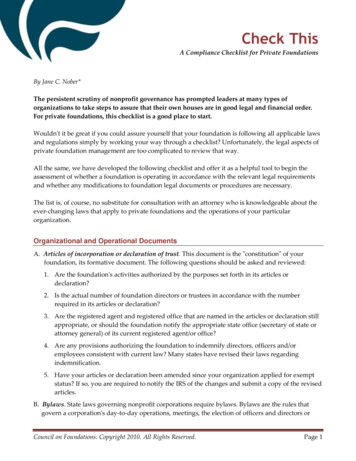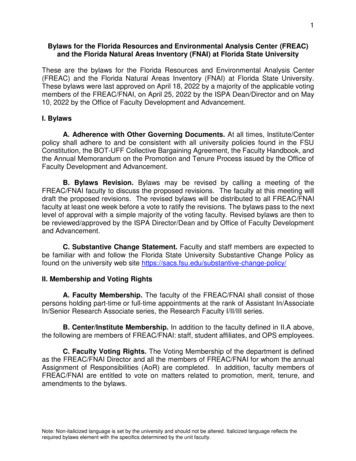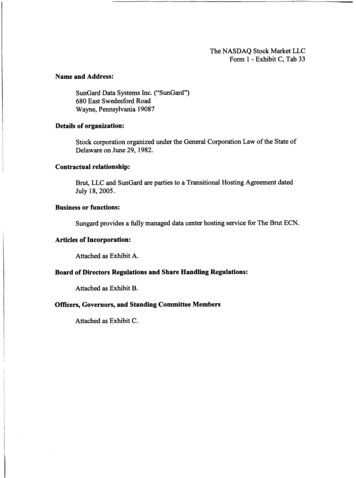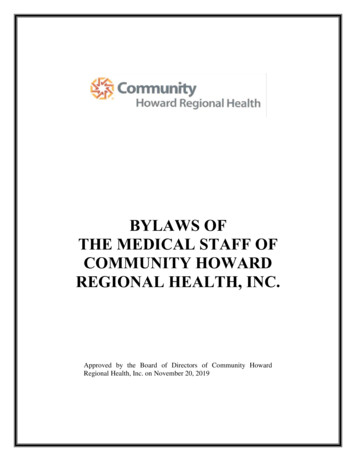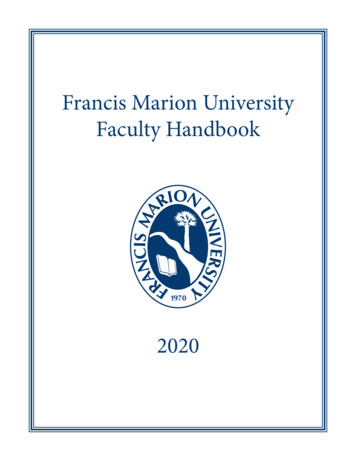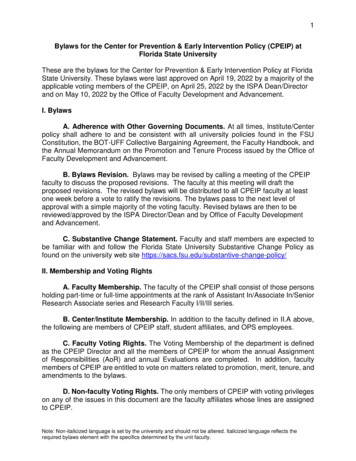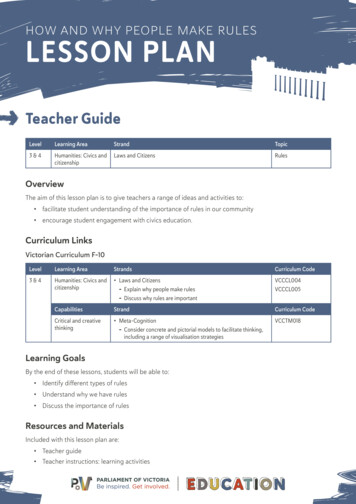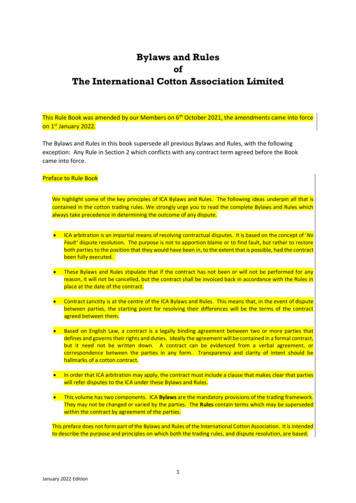
Transcription
Bylaws and RulesofThe International Cotton Association LimitedThis Rule Book was amended by our Members on 6th October 2021, the amendments came into forceon 1st January 2022.The Bylaws and Rules in this book supersede all previous Bylaws and Rules, with the followingexception: Any Rule in Section 2 which conflicts with any contract term agreed before the Bookcame into force.Preface to Rule BookWe highlight some of the key principles of ICA Bylaws and Rules. The following ideas underpin all that iscontained in the cotton trading rules. We strongly urge you to read the complete Bylaws and Rules whichalways take precedence in determining the outcome of any dispute. ICA arbitration is an impartial means of resolving contractual disputes. It is based on the concept of ‘NoFault’ dispute resolution. The purpose is not to apportion blame or to find fault, but rather to restoreboth parties to the position that they would have been in, to the extent that is possible, had the contractbeen fully executed. These Bylaws and Rules stipulate that if the contract has not been or will not be performed for anyreason, it will not be cancelled, but the contract shall be invoiced back in accordance with the Rules inplace at the date of the contract. Contract sanctity is at the centre of the ICA Bylaws and Rules. This means that, in the event of disputebetween parties, the starting point for resolving their differences will be the terms of the contractagreed between them. Based on English Law, a contract is a legally binding agreement between two or more parties thatdefines and governs their rights and duties. Ideally the agreement will be contained in a formal contract,but it need not be written down. A contract can be evidenced from a verbal agreement, orcorrespondence between the parties in any form. Transparency and clarity of intent should behallmarks of a cotton contract. In order that ICA arbitration may apply, the contract must include a clause that makes clear that partieswill refer disputes to the ICA under these Bylaws and Rules. This volume has two components. ICA Bylaws are the mandatory provisions of the trading framework.They may not be changed or varied by the parties. The Rules contain terms which may be supersededwithin the contract by agreement of the parties.This preface does not form part of the Bylaws and Rules of the International Cotton Association. It is intendedto describe the purpose and principles on which both the trading rules, and dispute resolution, are based.1January 2022 Edition
ContentsSECTION 1: INTRODUCTIONDefinitions:General BylawsThe contract:i) Administrative termsii) Membership and registration termsiii) General trading termsi) The application of Bylaws and Rulesii) Closing contracts in special casesPage 5Page 6Page 7Page 12Page 15Page 16SECTION 2: RULESShipment and the bill of ladingInsuranceInvoicing and paymentSales ‘on call’Bale tare and weightQuality of the cotton deliveredSamplingClaimsExtending time limitsInstrument testingMicronaire and allowancesStrength and allowancesClosing contractsPage 19Page 20Page 22Page 23Page 24Page 29Page 31Page 32Page 35Page 35Page 36Page 37Page 37SECTION 3: ARBITRATION BYLAWSIntroductionPage 44NoticesTechnical arbitrationTechnical appealsSmall Claims technical arbitrationQuality arbitrationQuality appealsAmicable settlementsFees and chargesUnfulfilled awards and defaulting partiesPage 45Page 46Page 53Page 57Page 66Page 77Page 79Page 80Page 84SECTION 4: ADMINISTRATION BYLAWSMembership and registrationPage 89CommitteesDisciplinary proceduresPage 91Page 942January 2022 Edition
Section 1:Introduction3January 2022 Edition
Section 1: rative termsMembership and registration termsGeneral trading termsGeneral Bylaws12The contract (on line only)4January 2022 Edition567
INTRODUCTIONBylaws are the mandatory provisions of the Association which cannot be changed or varied by theparties.DefinitionsBylaw 100In our Bylaws and Rules, and in any contract made under our Bylaws and Rules, the followingexpressions will have the meanings given unless their context clearly shows them to have a differentuse:Administrative terms1Arbitration Strategy Committee’ means the committee of which an arbitrator must be amember in order to be appointed as a Chair of a first tier tribunal or technical appealcommittee. In order to be eligible to become a Chair member of the Arbitration StrategyCommittee, that arbitrator must be / have been an ICA arbitrator for at least 5 years.2‘Articles’ means our Articles of Association and any changes to them which are in force.3‘Bylaws’ and ‘Rules’ mean all our bylaws and rules which are in force.4‘Committee’ means any committee elected by the Individual Members. Committeemembers will include anyone eligible, appointed or nominated to serve under our Articles.5‘Director’ means any of our Directors, whether Ordinary or Associate, and includes thePresident, First Vice-President, Second Vice-President, Treasurer and immediate pastPresident.‘Associate Director’ means a Director invited each year by the Directors and approved bythe Members to serve the common interests of the industry.‘Ordinary Director’ means a Director elected by the Individual Members. It does notinclude the President, First Vice-President, Second Vice-President, Treasurer orimmediate Past President.‘Immediate Past President’ does not include a President who is removed pursuant toArticle 69 or ceases to be a Director pursuant to Article 80.6‘General Meeting’ means a meeting of our Individual Members called under our Articles.7‘Month’ means a calendar month.5January 2022 Edition
8‘Observer’ means a probationary arbitrator who, for training purposes, may be appointedby the Association to act as an unpaid observer on technical arbitration tribunals andtechnical appeal committees. The observer will not participate in, nor influence, thetribunal’s decision making process.9‘Our’ means whatever is owned by us or issued by us.10‘President’ includes the First Vice-President or Second Vice-President or anyoneappointed by the Directors under our Articles to carry out the duties of an absentPresident.11‘Place of business’ of any Individual Member or Registered Firm means an office wherethe Directors consider an Individual Member or Registered Firm carries out business.12The ‘Rule Book’ means the book in which we publish our Bylaws and Rules.13The ‘Secretary’ means the person the Directors have appointed to act as Secretary. AnAlternate Secretary appointed by the Directors may act in place of the Secretary.14‘We’, ‘us’ and ‘ICA’ mean The International Cotton Association Limited.15‘In writing’ and ‘written’ include printing and other ways of reproducing words on paperor on a screen or website. Written correspondence can be delivered by post, hand, fax,e-mail and so on.16‘ICA List of Unfulfilled Awards’ consists of two parts.‘ICA List of Unfulfilled Awards: Part 1’means the list of companies who have failed to fulfilan arbitration award.‘ICA List of Unfulfilled Awards: Part 2’ means the list of companies evidenced to be relatedto companies appearing on the ICA List of Unfulfilled Awards: Part 1.Membership and registration terms17‘Affiliate Industry Firm’ means a firm or organisation registered as such under our Bylaws.18‘Agent Firm’ means a firm or organisation registered as such under our Bylaws.19‘Firm’ means any partnership, un-incorporated body or company carrying out business.20‘Individual Member’ means a person elected to be an Individual Member of a memberfirm under our Articles.21‘Member Firm’ means a Principal Firm, an Affiliate Industry Firm, an Agent Firm or aRelated Company.6January 2022 Edition
22‘Non-member’ means any person who is not an Individual Member of the Association.23‘Non-registered firm’ means any firm that is not a Registered Firm of the Association.24‘Principal Firm’ is a Merchant, Producer or Mill and means a firm or company registeredas such under our Articles and Bylaws.25‘Registered Firm’ means all Principal Firms, Affiliate Industry Firms, Related Companies,Affiliated Associations, Association Member Firms and Agent Firms, details of which areentered in the Register of Registered Firms.26‘Registered’ means registered or re-registered and ‘Registration’ means registering or reregistering.27For the purposes of these Bylaws and Rules, ‘Register of Registered Firms’ means our listof Principal Firms, Affiliate Industry Firms, Related Companies, Affiliated Associations, andAgent Firms.28‘Registered Firm’, means any firm listed in our register of Registered Firms as defined inour Articles.29‘Related Company’ means a company related to a Principal Firm or an Affiliate IndustryFirm.General trading terms30‘American cotton’ means all cotton grown anywhere within the contiguous states of theUnited States of America, including cotton known as Upland, Gulf or Texas cotton, but notincluding the Sea Island or Pima varieties.31‘Certified laboratory’ means a laboratory that is on an approved list issued by us.32‘Combined transport’, ‘intermodal transport’ and ‘multimodal transport’ mean deliveringcotton from one place to another using at least two different means of transport.33‘Combined transport document’ means a bill of lading or other document of titleproduced by a shipping company, combined transport operator or agent covering cottonbeing moved by combined transport, intermodal transport or multimodal transport.34‘Combined transport operator’ means a person or firm which produces a combinedtransport document.35‘Container freight station’, ‘CFS’ and ‘container base’ mean a place where the carrier ortheir agent loads or unloads containers under their control.7January 2022 Edition
36‘Container yard’ and ‘CY’ mean a place where containers can be parked, picked up ordelivered, full or empty. A container yard or CY may also be a place where containers areloaded (or stuffed) or unloaded (or de-vanned).37‘Control limit’ means the variation in readings taken on different instruments, using thesame cotton.38“Controller” Means an independent 3rd party, inspection company, or experienced incotton weighing, taring, sampling and surveying.39‘Cotton waste’ will be treated as cotton if it had been included in contracts which aresubject to our Bylaws and Rules.40'Country damage' is the damage or deterioration of the fibre caused by the absorption ofexcessive moisture, dust or sand from the exterior because it has been:aexposed to the weather; orbstored on wet or contaminated surfaces,prior to loading to trucks/containers or the vessel.Country damage does not include:41cany internal damage; ordany other contamination; oreany damage which takes place after loading to trucks/containers or the vessel.‘Date of arrival’ will, depending on the context, have one of the following meanings:aFor break bulk shipments, it will mean the date the vessel arrives in the port ofdestination named in the bill of lading. But, if the vessel is diverted or the cotton ismoved to another ship, it will be the date the cotton arrives in the port stated inthe bill of lading or in another port acceptable to the buyer.bFor cotton shipped in containers, it will be the date the cotton arrives in the port ofdestination named in the bill of lading or the combined transport document. But,if the carrying vessel is diverted or the containers are moved to another ship, it willbe the date the containers arrive in the port stated in the bill of lading or in anotherport acceptable to the buyer.cFor other means of transport it will be the date each delivery is made to the placestated in the contract.8January 2022 Edition
42‘Dispute’ or ‘difference’ relating to a contract will include any argument, disagreement orquestion about how to interpret the contract, or the rights or responsibilities of anyonebound by the contract.43‘False packed bale’ is a bale containing: substances which are not cotton; or damaged cotton; or good cotton on the outside and inferior cotton on the inside; or pickings or linters instead of cotton44Far East cotton’ means cotton grown in Bangladesh, Burma, China, India or Pakistan.45‘Fixed Price’ is the value per unit the Buyer pays the Seller for cotton. The Fixed Price isarrived at in two ways:aThe value per unit quoted at the time of the sale and stated as price per unit on thecontract.bThe combination of the fixation(s) of an on-call contract and the basis quoted onthe contract, expressed in the currency unit per weight unit as stated in the contract.46‘Foreign matter’ means anything that is not part of the cotton plant.47‘Full container load’ and ‘FCL’ mean an arrangement which uses all the space in acontainer.48‘Less than container load’ and ‘LCL’ mean a parcel of cotton which is too small to fill acontainer and which is grouped by the carrier at the container freight station with similarcargo going to the same destination.49‘House to’, ‘container yard to’ and ‘door to’ mean loading controlled by the shipper at theplace (house, CY or door) of their choice. Whoever books the freight must pay all costsbeyond the point of loading and the cost of providing the containers at the house, CY ordoor.50‘ICA Bremen Certified Laboratory’ means a laboratory certified by ICA Bremen.51‘Immediately’ means within three days.52‘Institute Cargo Clauses’ and ‘Institute Commodity Trades Clauses’ mean the clauses ofthe Institute of London Underwriters.53‘Internal moisture’ or ‘Moisture regain’ mean the weight of moisture in the cottonexpressed as a percentage of the weight of the fibre when totally dry.9January 2022 Edition
54‘Lot’ is a number of bales placed under one mark.55‘Lot number’ is a group of bales within a shipment or delivery identified by the same markor lot number. In the absence of marks or lot numbers, the lot number will be deemed tobe the container or truck number56‘Member Controller’ means an ‘Controller’ that is a current active Member of the ICA.57‘Mixed packed bale’ is a bale containing many different grades, colour or staple.58‘Marine cargo insurance’ and ‘transit insurance’ mean insurance against the risks coveredby the Marine Policy Form (MAR form) used in conjunction with the Institute CargoClauses, or covered by similar first-class policies in other insurance markets.59‘Micronaire’ means a measurement of the combination of fineness and maturity of rawcotton fibre.60‘No control limit’ and ‘NCL’ mean that no control limit is allowed.61‘Nominated Representative" Means a Company's own employee, or such qualified expertor any other entity entrusted to represent the appointing party's interests to act inmatters of sampling, surveys, weighing and taring’62‘On-board bill of lading’ means a bill which is signed by the captain or their agent whenthe cotton has been loaded on the ship.63‘Percentage allowance’ means a percentage of the invoice price.64‘Pier to’, ‘container freight station to’ and ‘container base to’ mean that the carriercontrols the loading. The cotton must be delivered to the carrier at the pier, containerfreight station or container base.65‘Plated bale’ is a bale in which a layer of very different quality cotton appears on theoutside of at least one side.66‘Point of destination’ means the exact place where the cotton is delivered to the personwho has ordered it, or is delivered to their agent, and where the carrier's responsibilityends.67‘Point of origin’ means the exact place where the carrier or their agent receives the cottonand where the carrier’s responsibility begins.68‘Prompt’ means within 14 days (two weeks).69‘Shipment’ means the loading of cotton onto any means of transport for delivery from theseller or their agent to the buyer, or to a carrier who can provide a bill of lading or acombined transport document.10January 2022 Edition
70‘Shipper's load and count’ means the shipper is responsible for the contents of thecontainer.71‘Shipping’ or ‘shipped’ means loading or loaded for shipment.72‘Shipping documents’ means the document of title showing how the cotton is to beshipped under the contract.73‘Spread Trade’. A cotton futures spread trade is the simultaneous trading of two oppositepositions in two different months. Each month traded is referred to as a leg. Example ofa spread, purchase 5 March futures contracts and sell 5 May futures Contracts74‘Strikes, riots and civil commotions insurance’ means insurance against the risks set outin the Institute Strikes Clauses (Cargo) or Institute Strikes Clauses (Commodity Trades), orsimilar clauses of other first-class insurance markets.75‘Synthetic Price Future’ is when Ice Cotton Futures are “locked” at the daily limit, asynthetic futures price is created by the simultaneous but opposite trading of a call andput option at the same expiry and strike price. A long call option and short put optionyields a synthetic long future while a short call option and a long put option yields asynthetic short future.76‘Tare’ means the weight of wrapping, bands, ropes or wires used to cover cotton bales.77‘To house’, ‘to container yard’ and ‘to door’ mean delivery to the warehouse or millselected by the person who booked the freight.78‘To pier’, ‘to container freight station’ and ‘to container base’ mean that the carrier willunload (de-van) at their warehouse in the port of destination, in a container freight stationor container base.79‘Usual control limit’ and ‘UCL’ mean the variation allowed in readings to account for thenormal variation expected from different instruments, even if the same cotton is used.80‘War risks insurance’ means insurance against the risks set out in the Institute War Clauses(Cargo) or Institute War Clauses (Commodity Trades), or similar clauses of other first-classinsurance markets.11January 2022 Edition
General BylawsBylaw 101These Bylaws and Rules are governed by English law, deemed to have been made in England and anydisputes about their interpretation or effect are to be determined by the exclusive jurisdiction of theEnglish High Court. The Bylaws and Rules apply to all parties contracting under our Bylaws and Rulesplus any others engaged in matters mentioned or connected to, the Bylaws in this Rulebook.Bylaw 1021If a contract is made under our Bylaws and Rules:aall of the Bylaws in this book will apply to the contract and no amendment by thebuyer and seller is allowed; butbthe buyer and seller can agree terms in their contract which are different to any ofthe Rules.2If we change any of the Bylaws or Rules after the date of the contract, the change will notapply to the contract unless the buyer and seller agree otherwise. This is with theexception of those Bylaws in Section 3 covering arbitration timescales, notices, fees andother procedures. In such cases, the procedures and costs etc. in Appendix ‘C’ to be usedfor arbitration or appeal will be those in force at the time of making the application.3All other changes will apply when we say so.4If there is any conflict or contradiction between a provision contained in the contract(s)and a provision of the Letter(s) of Credit (or other related payment instrument) thecontracts(s) will have precedence over the Letter(s) of Credit and, for the purposes ofdetermining any dispute, will be deemed to govern the terms agreed between the parties.Bylaw 1031These Bylaws and Rules must not be translated into any other language unless theDirectors have agreed.2If there is a doubt or difference in the meaning between any translation and the English,the Bylaws and Rules in English will apply.3We are not responsible for any mistakes in any version of the Rule Book.Bylaw 104The powers which the Bylaws and Rules give to the President are also given to the First VicePresident, Second Vice-President and any acting President.Bylaw 10512January 2022 Edition
In these Bylaws and Rules:1If something must be done within a fixed number of days of an event, the number of dayswill not include the day of the event itself. Days allowed will run continuously.2Unless the buyer and seller agree otherwise, a kilogram will equal 2.2046 pound weight(lb).3‘He’, ‘him’ and ‘his’ mean ‘she’, ‘her’ and ‘hers’ if necessary.4Words referring to people can also refer to firms if necessary.5Words in the singular also cover the plural. Words in the plural also cover the singular.6Time is expressed in terms of the 24 hour clock. All times are given in Universal Time(Greenwich Mean Time).Bylaw 106All questions of fact and law arising during an arbitration conducted according to these Bylawsand Rules including, without limitation, the interpretation of all terms and conditions of acontract under these Bylaws and Rules, will be for the members of the Tribunal to decide andtheir decision shall prevail and will be final. The parties waive their right to appeal to the EnglishHigh Court under section 69 of the Arbitration Act 1996 on a question of law arising out of anICA arbitration award.Bylaw 1071The Association may at any time, and from time to time by Special Resolution, make, vary,alter or rescind Bylaws and Rules (not being inconsistent with any of the provision of theArticles) with the exception that any change to the appendices of the Bylaws and Rulescan be made by Ordinary Resolution of the Directors.2If a claimant owes unpaid arbitrators or other fees to the ICA, they shall not be allowed toapply for or commence arbitration until the amount is paid in full.Bylaw 108 / 1091The ICA management team has a quality assurance role with respect to ICA arbitrationservices.2Assisting where directed by the Tribunal or TAC concerned.3Ensuring that ICA Arbitrations are carried out in full compliance with the Arbitration Act,other relevant case law, accepted international best practise and in accordance with theTribunal and TAC’s directions.13January 2022 Edition
4Helping to collate the evidence, process submissions by the parties and makerecommendations to the President for the allocation of arbitrators in accordance with theICA BL&R.5Sustaining the timeliness and cost-effectiveness of ICA arbitration.6Reviewing arbitration awards before they are published and offering advice to the panelto assist in and avoidance of error.In order to enable an effective and respected service to be available to the industry and tosustain the reputation of the ICA.14January 2022 Edition
The ContractThe application of Bylaws and RulesBylaw 200Every contract made under our Bylaws and Rules will be deemed to be a contract made inEngland and governed by English law.Bylaw 2011Subject to Bylaws 302 and 330 the following clauses will apply to every contract madeunder our Bylaws and Rules, or containing words to similar effect:aThe contract will incorporate the Bylaws and Rules of the International CottonAssociation Limited as they were when the contract was agreed. This is with theexception of those Bylaws in Section 3 covering arbitration timescales, notices, feesand other procedures. In such cases, the procedures to be used for arbitration orappeal will be those in force at the time of making the application.bIf any contract has not been, or will not be performed, it will not be treated ascancelled. It will be closed by being invoiced back to the seller under our Rules inforce at the date of the contract.cAll disputes relating to the contract will be resolved through arbitration inaccordance with the Bylaws of the International Cotton Association Limited. Thisagreement incorporates the Bylaws which set out the Association’s arbitrationprocedure.dNeither party will take legal action over a dispute suitable for arbitration, other thanto obtain security for any claim, unless they have first obtained an arbitration awardfrom the International Cotton Association Limited and exhausted all means ofappeal allowed by the Association’s Bylaws.The words ‘all disputes’ can be changed to read ‘quality disputes’ or ‘technical disputes’.But if nothing else is agreed, the words ‘all disputes’ will apply.2Attention is drawn to Bylaws 302 and 330 which allow the Directors to deny arbitration.3This Bylaw will apply even if the contract is held to be invalid or ineffective, or was notconcluded.Bylaw 202Unless the buyer and seller agree otherwise, the provisions of the following will not apply tocontracts made under our Bylaws and Rules:1the Uniform Law on International Sales Act (1967); and15January 2022 Edition
2the 1980 Vienna Convention on Contracts for the International Sale of Goods.Bylaw 203For sales on call based any Intercontinental Exchange (‘ICE’) Cotton futures contract:1On a Buyer’s Call Contract, The Seller should communicate any filled fixation level and theresultant price to the Buyer as soon as possible after the fill. On a Seller’s Call Contract,the roles are reversed.2The fixation level and final price stated in the fixation confirmation for that fixed portionof cotton shall be binding upon both parties.3Price fixations may be achieved by either trading futures, or via calendar spread trades,option strategies or synthetically through options.Closing contracts in special casesBylaw 2041If a buyer or seller (in circumstances not covered by other Bylaws and Rules):aenters into an arrangement with their creditors or;bhas a receiver or administrator appointed to run their business; orcis asked to wind up the company through a petition; ordis judged by the President to be imminently subject to one of the above;either party may request a Declaration of Findings and must give the President full writtendetails, including a copy of the written notice of closure already sent to the other party,that support their request.2The President will then appoint a qualified ICA arbitrator to determine the date of closureand the price at which the contract(s) are to be invoiced back to the Seller, along with anyother outstanding amounts. The qualified ICA arbitrator will produce a Declaration ofFindings that may be ratified and signed by the President. The President has absolutediscretion over whether he agrees to ratify and sign the Declaration of Findings.3The party that requests the President to ratify and sign such a Declaration will enter intoan agreement with the President, holding the ICA, the qualified ICA arbitrator and thePresident harmless in the event a claim (from whatever source) being made against theICA, the qualified ICA arbitrator or the President arising out of the Declaration of Findings.16January 2022 Edition
Section 2:Rules17January 2022 Edition
Section 2: hipment and the bill of ladingInsuranceInvoicing and paymentSales ‘on call’Bale tare and weightQuality of the cotton deliveredSamplingClaimsExtending time limitsInstrument TestingMicronaire and allowancesStrength and allowancesClosing contracts18January 2022 Edition
RULESRules are the non-mandatory provisions of the Association and can be varied by the mutualagreement of the parties.Shipment and the Bill of LadingRule 200A signed bill of lading will be evidence of the date of shipment.Rule 2011The seller must provide an invoice or full and correct details of marks, ships’ names andother facts contained in the bill of lading within the time set out in the contract. If theseller does not do so, the buyer can close all or part of the contract covered in the bill oflading and invoice it back to the seller as laid down in our Rules. The buyer must do thiswithin 14 days (two weeks) of the deadline set out in the contract. If the seller providesthe invoice or details after the deadline, and the buyer intends to close the contract orany part of it, they must let the seller know within three days.2If there is no time limit set in the contract and the seller does not provide the invoice ordetails within 21 days (three weeks) of the date of the bill of lading, the above will apply.3Shipping Instructions and Letters of Credit must be issued for the full value of the quantityof the shipment, notwithstanding the allowed variation in weight of the shipment. (Pleasesee Rule 220).4In the event that Letters of Credit are opened late, or Shipments have not been made asstipulated in the contract, then both parties may agree to extend the shipment period. Ifthe parties cannot agree to extend the shipment period, then Rule 238 and Rule 239 apply.5Slight differences in marks will not be relevant.Rule 202If the buyer can prove that the details set out in the bill of lading are incorrect or do not meetthe terms of the contract, they can take the matter to arbitration. The arbitrators will decidewhether the buyer should accept the cotton with an allowance or have a chance to close outthe contract. For shipments over land, the buyer must apply for arbitration within 42 days (sixweeks) of receiving the details. For shipments by sea, he must apply within 28 days (four weeks)of receiving the details.Rule 20319January 2022 Edition
The contract will not be closed if the cotton, or part of it, is shut out from the named ship, aslong as the bill of lading is correct and fits the definition given in Bylaw 100. This only applies tocontracts for shipment, not to contracts for sailing or clearance.Rule 204If there is a dispute over a contract for the shipment of American cotton in containers from USports it will be settled under the ‘Container Trade Rules’ set out in Appendix B of our Rule Book.InsuranceRule 205When a buyer or seller takes out insurance on a shipment of cotton under a contract made underour Bylaws and Rules, the insurance must include:1‘Marine cargo insurance’ and ‘transit insurance’ in line with the Institute Cargo Clauses (A)or Institute Commodity Trades Clauses (A);2‘War Risks Insurance’ in line with the Institute War Clauses (Cargo) or the Institute WarClauses (Commodity Trades);3‘Strikes, riots and civil commotions insurance’ in line with the Institute Strikes, Clauses(Cargo) or Institute Strikes Clauses (Commodity Trades),and cover the invoice value o
The International Cotton Association Limited This Rule Book was amended by our Members on 6th October 2021, the amendments came into force . 30 'American cotton' means all cotton grown anywhere within the contiguous states of the United States of America, including cotton known as Upland, Gulf or Texas cotton, but not


